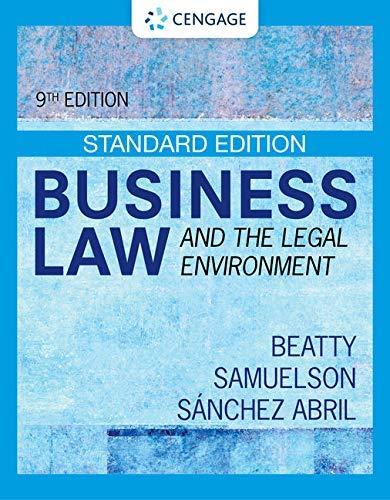Question
More specifically, the insurer's inclusion of 4(1)(a)-(b) merely assures that an insured will be reimbursed up to the policy limits on the declarations page, while
More specifically, the insurer's inclusion of 4(1)(a)-(b) merely assures that an insured will be reimbursed up to the policy limits on the declarations page, while clarifying no windfall payments will be made, i.e., an insured will not receive duplicate reimbursement or payments exceeding the underinsured policy limits on the declarations page. Paragraph (4)(a)(1), for example, provides that an insurer will pay no more than the difference between policy limits. This clause clarifies that an insurer is simply obligated to make up the difference between benefits received from the underinsured party and the insurer. Though free of ambiguity when only one person is injured, the text's vagueness becomes evident when multiple insured parties are injured if the negligent party's policy has no separate per person and per occurrence coverage.
Question 1
On fundus examination, does the preservation of the disc cup (no
obliteration) despite nasal blurring of the edges of the cup mean an
absence of papilloedema?
Question 2
What findings should be looked for during routine fundus examination
in patients on long-term chloroquine or other anti-malarial therapy for
treatment of systemic lupus erythematosus (SLE)?2014
Question 3
Which diseases are commonly associated with a macular star on
ophthalmoscopic examination?
Question 4
Can a cataract in one eye produce an afferent pupillary defect in that eye?
Question 5
What is meant by copper and silver wiring of retinal vessels on
ophthalmoscopy, what do they look like and which of them signifies
atherosclerosis?
Question 6
What is the difference between 'light touch' and 'fine touch' sensations
passed in the posterior column, and which one of these is tested with a
wisp of cotton?214
Question 7
What is apraxia of gait and what is Brun's apraxia?
Question 8
Why is it that, when eliciting the plantar reflex, we are supposed to stop
just before the ball of the great toe?
Question 9
Is there any rationale for giving dopamine agonists to aphasic
patients?
Question 10
Have either carbamazepine or dopamine agonists a role in the treatment
of aphasia? If yes, what type of aphasia?
Step by Step Solution
There are 3 Steps involved in it
Step: 1

Get Instant Access to Expert-Tailored Solutions
See step-by-step solutions with expert insights and AI powered tools for academic success
Step: 2

Step: 3

Ace Your Homework with AI
Get the answers you need in no time with our AI-driven, step-by-step assistance
Get Started


